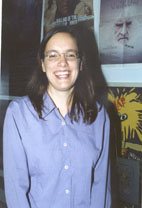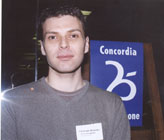
Isabelle
Thivierge, who is in her third year of the Traduction (Translation)
program, said, “Being francophone doesn’t change much for me. In my
department, I have almost no courses in English. If anything, I came
to Concordia hoping that I would have the chance to practise my English,
but that hasn’t happened as much as I would like!”

Christophe
Ryneczko, who is in his final year of the Traduction program, said “After
I completed a Master’s in English at McGill, I looked around for a good
program in translation, and Concordia seemed to offer the best. Being
French has been an asset, and my experiences in this respect have all
been positive. I really appreciated the co-op aspect of the program.”
Co-op gives Ryneczko a chance to alternate working as a translator with
terms of study.
|
by Caroline Plante
They are a minority within
a minority, yet professors and administrators alike say the francophone
presence at Concordia is enriching, even essential.
Francophone students make up about 30 per cent of Concordia’s Faculty
of Fine Arts, at least 25 per cent of the School of Community and Public
Affairs and 25 per cent of the Communication Studies Department.
“If we didn’t have francophones at Concordia, it would be a
disaster, a huge disadvantage for us,” said Communication Studies
Professor Dennis Murphy. “In production classes, francophones bring
new and interesting perspectives, new ways of criticizing material.”
French-speaking students seem to number at least 15 per cent of the student
population at Concordia, anglophones and allophones making up the rest.
Danielle Morin, Associate Dean for the Faculty of Commerce and Administration,
thinks that number will grow in the next few years. Already, she has noticed
a slight increase in the number of francophone students being accepted
in the business programs each year.
“Last year, we accepted 171 francophone students, but this year we
accepted 193. I think that in the future there will be more and more francophones
at Concordia because they need to learn English. The international business
world is dominated by English, so to be in a good position, these francophonestudents
need to be fluently bilingual,” Morin said.
Since her arrival in the Faculty five years ago, Morin has beefed up French
content by making sure departmental services could be provided in English
and French. She has also initiated a voluntary two-week orientation program
for incoming francophone students called Faire le Grand Saut!”
“We give them intensive [business] English lessons and we play business
jeopardy,” Morin said. “We also encourage all our students to
learn Spanish.” However, Commerce and Administration does not offer
courses in French.
The Faculty of Fine Arts operates in both languages. “We do have
courses that are taught in French,” said Dean Chris Jackson. “We
offered a French art history course because everybody in the class spoke
French. But the number of courses we teach in French varies from year
to the next.”
Jackson acknowledges that if one student speaks English and the other
25 speak French, the anglophone’s rights are predominant and the
class will be taught in English.
Murphy recalls a class he was teaching 10 years ago in which a francophone
student, knowing that her teacher spoke French, asked a question in her
mother tongue. Murphy remembers answering her in French. But one student,
terribly upset that the class had turned to French, stormed out of the
room. “He was enraged, and yelling, “This is an English institution!
It had never happened in one of my classes before,” Murphy said.
One reason the number of francophone students at Concordia is growing
is the high number of French-speaking international students that we accept.
Many of those students come from Europe, since Europeans are increasingly
being pushed to go study abroad in order to learn English.
In fact, the highest proportion of international students come from France,
said Fred Francis from Concordia’s Centre for International Academic
Co-operation.
“There is an agreement between Quebec and France which states that
students who choose to complete their degree abroad are not charged extra
for being international students,” he explained. Thus, international
students from France pay lower tuition at Concordia than students from
Ontario or British Columbia.
“Our university is very open culturally, ideologically and linguistically,”
said Daniel Salée, principal of the School of Community and Public
Affairs. “We have adapted well to the reality of a modern Montreal,
a multicultural Montreal.” To be accepted into the School of Community
and Public Affairs, students must be bilingual.
|
|
|



